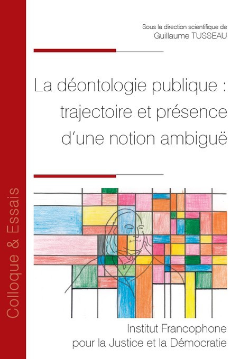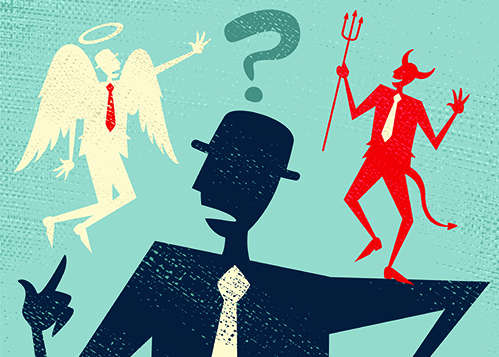


Governing the Digital City
13 February 2020
Investigating Street Art in Latin America
13 February 2020 The growing demand for deontology is affecting an increasing number of professions and missions, from politicians, civil servants and medical professions to journalists and scientists. There are multiple suggestions for how to meet this challenge: declarations of interest, transparency in decision-making, liaisons within organisations, and specialized institutions. Nevertheless, the question has not been settled. How far should one go? What principles should be affiliated? How to implement them? Guillaume Tusseau, university professor at the Law School, suggests some answers, based on a work he recently directed: “La déontologie publique, trajectoire et présence d’une notion ambiguë” (Public Deontology, trajectory and Presence of an Ambiguous Notion). Interview.
The growing demand for deontology is affecting an increasing number of professions and missions, from politicians, civil servants and medical professions to journalists and scientists. There are multiple suggestions for how to meet this challenge: declarations of interest, transparency in decision-making, liaisons within organisations, and specialized institutions. Nevertheless, the question has not been settled. How far should one go? What principles should be affiliated? How to implement them? Guillaume Tusseau, university professor at the Law School, suggests some answers, based on a work he recently directed: “La déontologie publique, trajectoire et présence d’une notion ambiguë” (Public Deontology, trajectory and Presence of an Ambiguous Notion). Interview.
The purpose of this work is to clarify what is included in the notion of public deontology, both in theory and in practice. Why did you feel this investigation was necessary?
Portrait de Jeremy Bentham (1748-1832). © National Portrait Gallery
Guillaume Tusseau : I have been working on the subject for a long time with members of a multidisciplinary research centre devoted to the work of Jeremy Bentham. It was in fact the latter, an 18th and 19th century English philosopher and jurist, who invented the term and the concept – not the same – of deontology. For fifteen years we had witnessed the emergence of this issue in Western democracies. With respect to France, there was first a commission created in 2010 on “reflections about preventing conflicts of interest in public life’’. Its report – “Pour une nouvelle déontologie de la vie publique” – led to a draft bill that was never included on the agenda in parliament. Even so, its work resulted in the first ethics charter for administrative jurisdiction. In 2012 – the year of the Cahuzac scandal – a new commission was created “on renovation and deontology of public life” which led to the establishment of the Haute Autorité pour la transparence de la vie publique (High Authority for Transparency in Public Life). It was a milestone in public life, and also for researchers because it allowed us to present our theoretical, philosophical, historical and legal reflections on deontology by directly connecting them to ongoing practices.
What was Jeremy Bentham referring to with this term?
G.T. : Bentham defined deontology as the science of duty (in ancient Greek, deon meant ‘‘it behooves, it is fitting’’). He devoted some of his last works to it, published posthumously under the name “Deontology or the Science of Morality”. In his mind, the first duty was to not harm others (including animals), and this applied to all levels. It began with a duty to oneself, to one’s inner circle, and expanded in concentric circles to duties in the public sphere.
He also thought about how it could be implemented…
Plan of the Panopticon. © Domaine public
G.T. : Yes. Indeed, he positioned himself in what is known as the science of institution engineering. To make sure deontology was effective, he called upon the principles of injunction, interest and duty. He thought up a set of incentive structures. On the level of public deontology, he proposed in particular civil service examinations. But above all he returned to his idea of the panopticon – which he had developed for prisons – with the aim of organising ministerial offices. Potential offenders (ministers and civil servants) would be placed in the centre of a building which the public could walk around while observing them. The idea was to bring public officers’ interests in line with their duties, motivating them through a system of material and symbolic incentives to carry out those duties for the benefit of the population. On the private level, Bentham was reflecting on what he called “indirect” legislation, which covered structures quite similar to nudges. This technique is quite fashionable nowadays, proposing to subtly influence our behavior in our own interests. Among other things, our project French Nudges explores the manuscripts he devoted to the subject.
Can any limits be placed on the conditions of deontology? Isn’t it going too far when, like in Sweden, a minister is asked to resign because she bought a chocolate bar with her ministerial credit card?
G.T. : Bentham would certainly have taken a consequentialist approach to that subject, namely that misconduct should be punished in proportion to the consequences. But in the same vein, things can go quite far if you follow the ‘‘once a thief, always a thief’’ adage, which has been used to justify “zero tolerance” penal policies. The exemplary aspect is also important. For example, if a civil servant embezzles money without facing charges, the temptation to imitate them is potentially greater. In fact, the core of the current dynamic seems to be based on developing what could be called a “deontological reflex”. I experienced this as a member of the Judicial Council, whose mission is to ensure the deontology of judges. Rather than being coercive, its approach is to encourage judges to reflect on their own professional practices and conduct from the point of view of the values expressed in their oath of office. Judges may ask themselves all kinds of questions, from the simplest to the most complex: can I write a detective novel that might give ideas to criminals? Can I be involved in political and community affairs like any other citizen? Can I give evidence about an accident I witnessed, knowing that my testimony could have more influence on the judge who will ultimately handle the case? etc. To answer these kinds of questions, the Judicial Council has set up a support and ethics monitoring department, a sort of ‘‘toll-free number’’ that judges may contact by phone or email to find assistance in answering such questions.Furthermore, the Judicial Council updated the handbook for the ethical obligations of judges with practical information sheets based on different cases that have arisen: family issues, new technologies, etc.
What about other areas of civil service?
G.T. : Every professional practice may require some adaptations. But there are requirements that seem general, notably concerning overlaps between public policy objectives and private life, which raises the issue of conflicts of interest. More generally, in civil service law, private conduct may have repercussions on one’s professional situation. For instance, if a policeman is found guilty of domestic violence he will naturally be punished under criminal law, but he is also liable to disciplinary action within the force. This principle regarding independence of criminal and disciplinary punishment is based in particular on protecting the dignity of office and the image of institutions. This is a fundamental point.
Aside from the matter of judges, can we consider public deontology to be progressing?
G.T. : Absolutely. But there is still a great deal of room for improvement before the deontological reflex and a culture of deontology are firmly established. Some sceptics have observed that deontology proceeds in fits and starts in reaction to scandals.
However, one should also keep in mind that the High Authority for Transparency in Public Life has ‘‘taken hold’’ in the institutional landscape, and its mission has become broader, in particular through its very recent takeover of the “Commission de déontologie de la fonction publique” (Public Service Ethics Commission) and by setting up an interest representative register. Bordering on theory and practice, a Monitor of Public Ethics has been created which is an important inducement in this regard. But there is also resistance, and there are limits. In France, for example, it was very hard to ask elected officials to state their income and wealth openly, while it has long been an accepted practice in many other countries. A real cultural shift has got to take place.
Can this progress help to restore trust between public opinion and politicians?
G.T. : It’s not that simple. The media has played a big part here. Investigative journalism is often decisive in uncovering (‘‘mettre au jour’’ rather than ‘‘mettre à jour’’ ?) deontological transgressions. But the media’s impact may be disappointing when sensationalism drives it to highlight scandals rather than bring to light improvments. François de Rugy is a case in point. Paradoxically, François de Rugy was very involved in public ethics issues while president of the National Assembly. During the ‘‘lobster affair’’, some media mentioned this fact, but naturally in a limited, ironic way since it was a relatively technical subject, without reporting on the contributions he made in this area that will live on after him. Nevertheless, we may expect this scandal to enable advances which can be partly credited to the ‘‘noise’’ generated by the media. From this standpoint, as Bentham recommended, we must pay attention to the consequences that ensue from the point of view of the greatest happiness of the greatest number.
Interview by Hélène Naudet, Vice Presidency for research
Guillaume Tusseau is a Professor of public law at Sciences Po. He is at the same time a specialist in constitutional law, and in particular in comparative constitutional litigation, and a theoretician of law, more particularly of the analytical theory of the law and of the works of Jeremy Bentham.
More information (in French)




